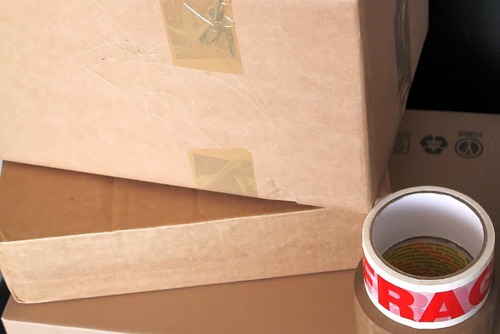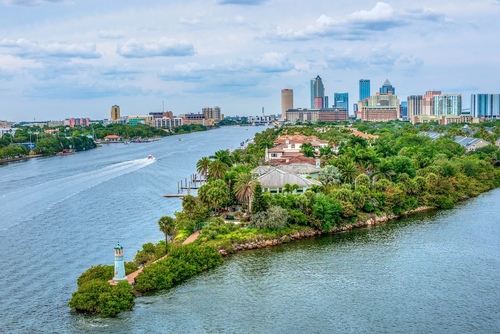In this comprehensive moving guide, we'll walk you through everything you need to know to make your transition as smooth as possible.
Moving to a new state offers a fresh start and new opportunities. Ohioans looking to escape the cold winters and embrace a warmer climate often turn their sights to Florida.
The Sunshine State beckons with its sunny weather, beautiful beaches, and diverse recreational activities. This article serves as your guide to navigating the journey from Ohio to Florida, ensuring a successful and enjoyable move.
Benefits of Moving from Ohio to Florida
Making the move from Ohio to Florida comes with numerous advantages.
Firstly, Florida's year-round sunshine and milder winters offer a more pleasant climate compared to Ohio's cold and snowy winters. This alone is often a compelling reason for people to relocate.
Additionally, there are a wide range of tourist attractions in Florida and outdoor activities, including beach outings, water sports, golfing, and fishing, making it an attractive destination for those seeking an active and vibrant lifestyle.
Furthermore, Florida's lower cost of living compared to Ohio can provide financial advantages and an improved quality of life.
Researching Your New Destination
Before packing up and heading south, it's crucial to conduct thorough research about your new destination. Florida is a diverse state with different regions, cities, and neighborhoods, each offering unique characteristics.
Start by considering factors such as schools, healthcare facilities, transportation options, and local amenities. Familiarize yourself with the various regions and determine which one aligns with your preferences and needs.
Budgeting and Financial Considerations
Creating a budget is an essential step when planning your move. Take into account housing expenses, utility costs, transportation, and potential differences in taxes between Ohio and Florida. Researching the cost of living in different areas of Florida will help you understand how your expenses may change. By properly budgeting for your move, you can ensure financial stability during the transition.
Finding a New Home
Finding a suitable home in Florida requires careful consideration and research. Determine whether you plan to rent or buy, and explore the available options in your desired area. Real estate websites and local agents can provide valuable insights into the housing market. Consider factors such as proximity to amenities, safety, and neighborhood characteristics to find a home that meets your requirements.
Packing and Organization
Packing efficiently is essential to ensure a smooth moving experience. Start by decluttering and getting rid of items you no longer need. Labeling boxes and using appropriate packing materials will help you stay organized and make unpacking easier. Consider creating an inventory of your belongings and keeping essential items handy, allowing for a seamless transition into your new home.
Hiring Professional Movers or DIY?
Deciding whether to hire a
professional moving company or handle the move yourself depends on various factors. Professional movers offer expertise, time-saving benefits, and liability coverage, reducing the stress associated with moving. However, if you prefer a more hands-on approach and have the necessary resources, a DIY move may be a viable option. Take time to weigh the pros and cons and choose the option that best suits your needs.
Transportation and Logistics
Consider the transportation options available for your move from Ohio to Florida. If you choose a DIY move, renting a moving truck or trailer may be necessary. Alternatively, you can opt for a moving service that handles the logistics for you. Plan your route, taking into account any potential stops, accommodations, and estimated travel time. Proper planning ensures a smooth and hassle-free journey.
Transferring Utilities and Services
As you prepare for the move, don't forget to arrange for the transfer of utilities and services. Contact your utility providers, such as electricity, water, internet, and cable, to notify them of your move. Ensure that services are transferred or disconnected according to your moving timeline. Make a checklist of subscriptions, address updates, and service transfers to stay organized during this process.
Updating Legal and Administrative Documents
Updating your legal and administrative documents is an important step when relocating to a new state. This includes updating your driver's license, vehicle registration, and voter registration. Research the specific requirements and deadlines in Florida and make sure to comply with the necessary procedures. Additionally, notify your insurance providers and healthcare professionals of your change of address.Settling into Your New Home
Once you arrive in Florida, take time to settle into your new home and community. Introduce yourself to neighbors, explore local attractions, and join community groups to establish connections. Familiarize yourself with the local services, schools, and recreational activities available. This will help you integrate into your new surroundings and make the most of your Florida experience.
Adapting to the Florida Lifestyle
If you are going to work in Florida you will need to embrace the lifestyle and adjust to a new cultural differences compared to Ohio. Take the opportunity to enjoy popular activities such as visiting the beach, exploring nature parks, and trying the diverse local cuisine. Engage with the vibrant community and participate in events that showcase the unique traditions and customs of Florida. Allow yourself to fully immerse in the beachy and outdoor-focused lifestyle that the state offers.
Preparing for the Move: Checklist and Timeline
To ensure a well-organized move, create a comprehensive checklist and timeline leading up to your moving day. Break down tasks into manageable steps, such as canceling subscriptions, forwarding mail, and notifying relevant parties of your change of address. This checklist will serve as a useful reference to ensure that no important details are overlooked during the chaotic moving process.
Dealing with Potential Challenges
Moving to a new state presents its own set of challenges. Prepare yourself by addressing potential hurdles and finding solutions. Florida's climate may require adjustment, especially if you're accustomed to Ohio's seasonal changes. Educate yourself about hurricane preparedness and local wildlife encounters to ensure your safety and well-being. By being proactive and informed, you can effectively navigate any challenges that may arise.
Moving from Ohio to Florida FAQ
Moving from Ohio to Florida opens up a world of opportunities and a change of lifestyle. The favorable climate, abundant recreational activities, and lower cost of living make Florida an attractive destination.
By conducting thorough research, planning your budget, organizing your move efficiently, and embracing the Florida lifestyle, your transition will be smooth and enjoyable. Get ready to embark on this exciting journey and experience all that Florida has to offer.
Is it expensive to move from Ohio to Florida?
While moving expenses vary, Florida generally has a lower cost of living compared to Ohio. Proper budgeting and planning can help manage the costs effectively.
How do I find a reliable moving company for my Ohio to Florida move?
Research reputable moving companies, read reviews, and ask for recommendations. Obtain multiple quotes and compare their services and pricing.
What should I pack for the move to Florida?
Pack essential items, clothing suitable for a warmer climate, personal documents, and sentimental belongings. Consider donating or selling items that you no longer need.
Are there any specific driving laws or regulations in Florida that I should know about?
Familiarize yourself with Florida's traffic laws and regulations. Ensure your driver's license and vehicle registration are up to date and comply with the state's requirements.
How can I meet new people and make friends in Florida?
Join local community groups, participate in events, and engage in activities that interest you. Volunteer work and recreational clubs can also provide opportunities to meet new people.







